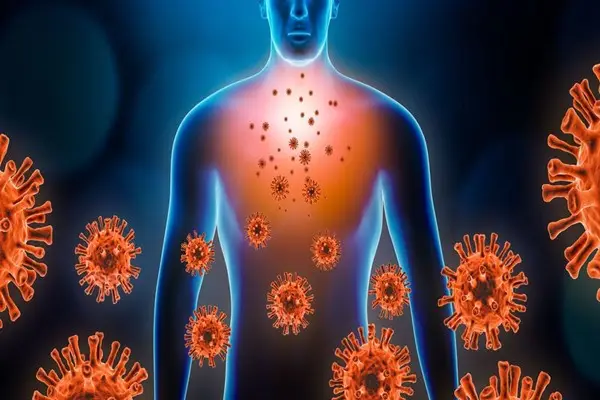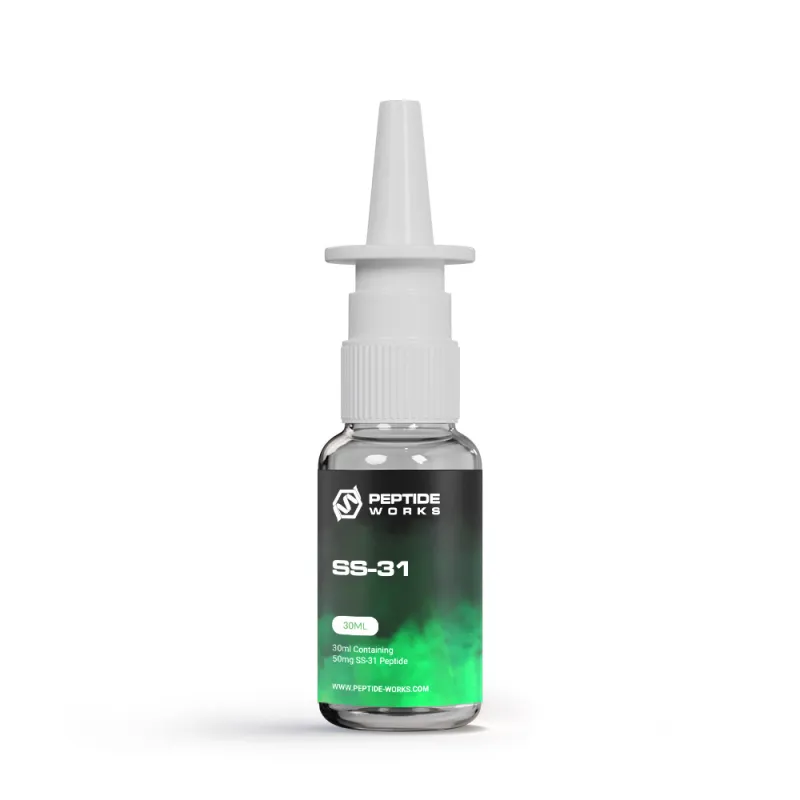
PROMO!
First order? Get 10% OFF with this code: 1storder
Written by

The SS-31 peptide has become a focus of scientific research for its potential to protect cells from stress and damage. It is known for its ability to target mitochondria, the small power centers inside cells that generate the energy required for life. By helping maintain mitochondrial health, SS-31 may improve energy balance and reduce harmful oxidative stress.
Current studies suggest that these actions could play a role in delaying age-related decline and lowering the risk of diseases tied to cellular dysfunction. Researchers are particularly interested in how SS-31 might influence conditions related to neurodegeneration, cardiovascular health, and metabolic imbalance.
In this article, we look at how SS-31 supports mitochondria, why this matters for disease protection, and what research shows about related peptides like Humanin.
Discover SS-31 Peptide from Peptide Works, a mitochondrial-targeted peptide studied for protecting cells from stress and supporting energy balance.

Preclinical studies and small clinical reports suggest that SS-31 binds to cardiolipin, a unique lipid that lines the inner mitochondrial membrane. This bond prevents structural breakdown and shields the mitochondria from excess reactive oxygen species (ROS). By lowering oxidative stress, cells avoid damage that often drives premature aging and chronic disease.
Researchers have also observed that SS-31 improves electron flow in the respiratory chain, the pathway that generates ATP. Stronger ATP output means cells can sustain energy even when under pressure from toxins, injury, or metabolic imbalance. These combined effects position SS-31 as a peptide of growing interest in mitochondrial research. One of the biggest challenges to mitochondrial health is oxidative stress.
Every cell produces small amounts of reactive oxygen species (ROS) when making energy. Normally, these molecules are balanced by antioxidants. When balance is lost, oxidative stress builds up and begins to damage DNA, proteins, and cell membranes. This process is a well-known factor in conditions such as Alzheimer’s, Parkinson’s, diabetes, and heart disease.
Because mitochondria are both the source and the target of ROS, researchers have looked for peptides that can protect them. SS-31 peptide has been studied for its ability to bind mitochondrial membranes, reduce oxidative stress, and maintain energy flow.
Humanin peptide is another example, with reports showing protective effects against age-related oxidative injury. Both are important in ongoing research on disease prevention. Nowhere are these effects more visible than in the brain, where mitochondrial decline fuels neurodegeneration.

In Alzheimer’s disease, the SS-31 peptide has been shown in research to protect brain cells from amyloid-beta stress. Studies found it reduces toxic buildup, preserves synaptic proteins, and stabilizes mitochondrial membranes. These actions support energy balance in neurons and improve memory performance in animal research.
By lowering oxidative stress in brain mitochondria, SS-31 helps slow changes linked to cognitive decline. Other peptides have also drawn interest in this area. Humanin peptide, discovered in mitochondria, has been studied for its ability to block cell death signals and reduce amyloid-related damage.
When considered together, Humanin and SS-31 highlight how mitochondrial peptides may play a role in defending neurons against processes that drive Alzheimer’s, Parkinson’s, and other age-related brain conditions. Beyond the brain, mitochondrial decline contributes to the gradual physical changes of aging.
Explore Humanin Peptide from Peptide Works, a mitochondrial peptide investigated for its role in reducing oxidative injury and supporting healthy aging.
Aging affects more than memory it weakens muscles, lowers endurance, slows the heart, and disrupts metabolism. Mitochondrial peptides are being explored for their role in countering these systemic changes. In older animals, the SS-31 peptide has been linked to better exercise tolerance, stronger muscle performance, and improved mitochondrial signaling that keeps tissues functioning longer. These outcomes highlight how SS-31 may address physical decline beyond the brain.
Humanin peptide adds another perspective. Its levels drop with age, and this loss is tied to frailty and reduced resilience. Supplementation in research models has shown improved insulin sensitivity, protection from cell death signals, and healthier metabolic control. Together, SS-31 and Humanin highlight how mitochondrial peptides may influence multiple aspects of aging biology, offering clues into healthspan and longevity.
| Peptide | Key Mechanism in Aging | Reported Benefits in Research | Connection to Age-Related Decline |
|---|---|---|---|
| SS-31 | Binds cardiolipin, stabilizes mitochondrial membranes, improves ATP production | Better muscle strength, improved endurance, reduced redox stress in aged animals | May slow physical decline and preserve tissue energy balance |
| Humanin | Blocks apoptosis signals, reduces amyloid toxicity, supports metabolic pathways | Improved insulin sensitivity, reduced frailty, longer lifespan in some models | Decline in Humanin levels with age linked to vulnerability and reduced resilience |
These age-related patterns also explain why protecting mitochondria is central to disease prevention.

Mitochondria do more than supply energy. They regulate survival pathways, calcium balance, and responses to cellular stress. When these systems fail, mitochondria release danger signals that trigger apoptosis or uncontrolled inflammation. Over time, this damage builds across organs.
In the heart, it can weaken contractions and increase plaque growth in arteries. In the kidneys, it contributes to diabetic injury and loss of function. In metabolic tissues, it disrupts insulin response and raises disease risk. Preventing this early breakdown is considered vital in protecting long-term health.
Preclinical research shows that SS-31 peptide can act at this critical point. It binds mitochondrial membranes, helps preserve ATP flow, and reduces stress pathways that lead to cell death. In models of heart failure and kidney disease, SS-31 has limited injury by keeping mitochondria functional.
By targeting the earliest stages of dysfunction, SS-31 demonstrates how mitochondrial protection could be central to preventing chronic disease. The heart provides a clear example of how mitochondrial peptides may shape long-term health.
SS-31 peptide acts on cardiac mitochondria, which supply the ATP needed for contraction and relaxation of the heart muscle. Through its interaction with cardiolipin located in the inner mitochondrial membrane, it helps stabilize cristae structure and maintain respiratory chain efficiency. This improves energy output and reduces stress pathways that can impair myocardial function during overload or ischemia.
Preclinical studies show that SS-31 lowers fibrosis, preserves diastolic relaxation, and limits mitochondrial swelling in stressed heart tissue. It also prevents the opening of the permeability transition pore, a trigger for cardiomyocyte death. These effects make SS-31 an important candidate in cardiovascular research focused on protecting energy metabolism and reducing tissue injury. Taken together, these insights show why SS-31 continues to attract attention in disease protection.
SS-31 peptide shows promise in protecting mitochondria and supporting healthy function across heart, brain, and metabolic systems. Current evidence points to its ability to reduce cellular stress and slow pathways tied to chronic disease. While findings are still preclinical, progress in this area highlights important possibilities for disease protection.
At Peptide Works, we remain dedicated to supporting scientists worldwide by supplying high-quality peptides that enable deeper exploration and future discovery.
All products discussed are supplied for research purposes only and are not intended for human use.
[1] Zhu Y, Wang H, Fang J, Dai W, et al. SS-31 Provides Neuroprotection by Reversing Mitochondrial Dysfunction after Traumatic Brain Injury. Oxid Med Cell Longev. 2018 Aug 27;2018:4783602.
[2] Zhu Y, Luo M, Bai X, Li J, et al. SS-31, a Mitochondria-Targeting Peptide, Ameliorates Kidney Disease. Oxid Med Cell Longev. 2022 Jun 6;2022:1295509.
[3] Chistiakov DA, Sobenin IA, Revin VV, Orekhov AN, Bobryshev YV. Mitochondrial aging and age-related dysfunction of mitochondria. Biomed Res Int. 2014;2014:238463.
[4] Miller B, Kim SJ, Kumagai H, Yen K, Cohen P. Mitochondria-derived peptides in aging and healthspan. J Clin Invest. 2022 May 2;132(9):e158449.
[5] Coradduzza D, Congiargiu A, Chen Z, Cruciani S, et al. Humanin and Its Pathophysiological Roles in Aging: A Systematic Review. Biology (Basel). 2023 Apr 6;12(4):558.
ALL CONTENT AND PRODUCT INFORMATION AVAILABLE ON THIS WEBSITE IS FOR EDUCATIONAL PURPOSES ONLY.
DISCLAIMER: These products are intended solely as a research chemical only. This classification allows for their use only for research development and laboratory studies. The information available on our Peptide Works website: https://peptide-works.com/ is provided for educational purposes only. These products are not for human or animal use or consumption in any manner. Handling of these products should be limited to suitably qualified professionals. They are not to be classified as a drug, food, cosmetic, or medicinal product and must not be mislabelled or used as such.
Peptide Works
Related Articles

What are the Best Cognitive Peptides?
Cognitive peptides are short chains of amino acids that researchers are exploring for their potential effects on brain function. They

Achieving increased skin pigmentation without prolonged sun exposure has been demonstrated with Melanotan peptides in research. Two commonly studied options,

Can PTD-DBM Hair Growth Peptide Stop Balding?
Hair thinning and balding affect millions worldwide, often leading to frustration and limited options. This challenge has driven researchers to